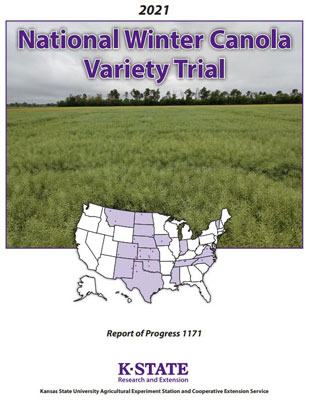The results of the 2021 National Winter Canola Variety Trial (NWCVT) are now available online at https://bookstore.ksre.ksu.edu/pubs/SRP1171.pdf

The objectives of the NWCVT are to evaluate the performance of released and experimental varieties, determine where these varieties are best adapted, and increase the visibility of winter canola across the United States. Breeders, marketers, and producers use data collected from the trials to make informed variety selections. The NWCVT is planted at locations in the Great Plains, Northern Plains, Midwest, and Southeast.
Seed for the NWCVT was distributed to 32 test sites in 13 states for the 2020–2021 growing season. The locations receiving seed are illustrated on the map on the front cover (see above). See the back cover for a listing of participating cooperators. Of the 32 entries, 18 are commercial and 14 are experimental. These entries were provided by seven seed suppliers. All entries in the trial were treated with insecticide and fungicide seed treatments to control insects and seedling diseases through the late fall and early winter months.
In general, the 2020–2021 growing season was marked by cool and wet spring conditions that resulted in extremely high yields. Temperatures were moderate going into the winter months, and February was highlighted by a massive temperature drop to record low levels. However, winterkill was not a major factor because the crop was well acclimated to the bitter cold and snow cover blanketed many locations. Only minor damage was observed following late freezes at the reproductive stage.
Eighteen harvested test sites in eleven states are included in this report: Akron, CO; Dallas Center, IA; Vincennes, IN; Belleville, Colby, Garden City, Hutchinson, Manhattan, and Norwich, KS: Creston, MT; Clovis, NM; Miami, OK: Ashland City and Springfield, TN: Bushland and Chillicothe, TX: Orange, VA; and Alburgh, VT. Fourteen locations were not harvested or had poor data quality because of inadequate stand establishment, winterkill, or heavy rainfall.
Acknowledgments
This work was funded in part by the fees paid by seed suppliers, the United States Department of Agriculture National Institute of Food and Agriculture Supplemental and Alternative Crops Competitive Grants Program, and the Kansas Agricultural Experiment Station. Allison Aubert assisted with organizing, packaging, planting, harvesting, data collection, and publication writing. Sincere appreciation is expressed to all participating researchers and seed suppliers who have a vested interest in expanding winter canola acres and increasing production in the United States.
Mike Stamm, Canola Breeder
mstamm@ksu.edu